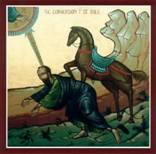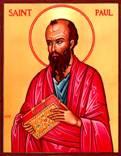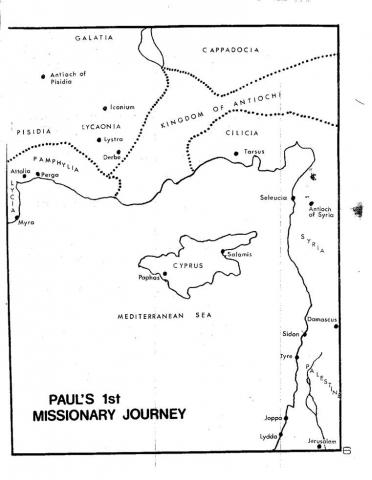St. Paul: Conversion and 1st Journey
UNIT 2: ST. PAUL
Objective: Students should be able to discuss the conversion of Saul, the importance of St. Paul’s ministry, and detail each of his 3 missionary journeys and his final journey to Rome.
PAUL AND HIS JOURNEYS: WEEK 1

Conversion of Saul:
- Saul’s early life: Saul was born in the city of Tarsus of Cilicia. Find it on your maps.
Tarsus was a shipping and merchant center and a center of Greek culture. Greek was spoken there, and the citizens of Tarsus had Roman citizenship. Saul’s Greek name was Paul. Saul’s parents were Jewish, strict Pharisees. Saul learned tent-making as a trade. When Saul was 15 years old, he was sent to Jerusalem to study with the great rabbi Gamaliel. His dedication to the Jewish faith led him to violently oppose the new Christian Church. Read Acts 8:1-3. In fact, Philip had fled Jerusalem and was therefore with the Ethiopian minister in the desert because of the persecution of Saul!
- Read the story of Saul’s conversion in Acts 9:1-25. Saul was chasing fleeing Christians. The road to Damascus was about 150 miles long – a week’s journey. Find Jerusalem and Damascus on your maps. After his conversion, Saul spent three years in the desert in seclusion. His world had been turned upside down! Can you imagine his confusion?
- Now imagine the confusion of the other Christians. Saul had been their greatest enemy. He came to Jerusalem. How do you suppose he was greeted? Read Acts 9:26-30. Who vouched for Saul to the other Christians? Where was Saul sent for his own safety? Find Caesarea and Tarsus on your maps.
- Read Acts 11:22-26 and 12:25– Who was in Antioch and why? Where did he go to retrieve Saul? Saul had been in Tarsus for 10 years! What do you suppose Saul had been doing in Tarsus – the Bible says nothing. Where did Barnabas and Saul go together? Then they returned to Antioch – something great was about to happen…

Paul’s First Missionary Journey:
Read the 1st part of the story of Paul’s journeys. Follow his course carefully on your classroom map, or have each student trace each journey on the maps on the following pages. Have each student read one passage, tell the class about it, and place a pushpin in the classroom map for the location. In the end, connect all the pushpins with string. Alternatively, draw lines between dots on each individual student’s map – or do both! Have one student read each passage and tell the others what happened in that place. Then summarize the whole journey for the class.
1. First Missionary Journey, 45—51 A.D., Acts 13:13—14:28
A. Antioch, first called “Christians”, Paul and Barnabas: Acts 13:1-3
B. Cyprus
1. Salamis, John Mark joins them: Acts 13:4-5
2. Paphos, Elymas the Magician: Acts 13:6-12
C. Perga in Pamphylia, John Mark leaves: Acts 13:13
D. Pisidian Antioch, shook dust off feet: Acts 13:14-16, 42-52
E. Galatia
1. Iconium: Acts 14:1-5
2. Lystra, Timothy’s home, Zeus and Hermes, stoned: Acts 14:6-20
3. Derbe: Acts 14:20-23
F. Antioch: Acts 14:24-28
- Places and their context: As the students move Paul thru his journey, give them a bit of background on the places he would visit. This first journey took place all in the Greek regions of Asia Minor. Paul always taught in the local Jewish synagogue, but he also preached to the Greeks.
Antioch: the center of Paul’s travels and his “home base”. Here we were first
given the name Christian, meant to be derogatory, but accepted in time.
Antioch was an important city in northern Syria – the third largest city in
the Roman Empire (after Rome and Alexandria).
Cyprus: Barnabas was from Cyprus. Cyprus is an island. The first Christians in
Cyprus were converted by disciples from Jerusalem, fleeing the
persecution of Saul! At first, they reached out only to other Jews, but later
to Gentiles.
Galatia: Galatia was not a city but a province, or state. Its capital, Ancyra, is now
the capital of Turkey, Ankara. Iconium, Lystra, Derbe, and Antioch of
Pisidia were all cities in the province of Galatia. Timothy was a native of
Lystra; he would later join Paul on many of his journeys. Paul began the
church in Galatia with appointing priests (presbyters). But, after Paul left,
the Galatians began to feel they had to obey the Jewish Law to be really
Christian. Paul wrote them a letter, the Epistle to the Galatians, reminding
them of the new Law of the Spirit. Can the students find the Epistle to the
Galatians in their Bibles?
An Events in Acts Quiz:
- Name the city where the name “Christian” was first used.
- List 3 characteristics from his childhood that would serve Paul well in his ministry.
- Give the who, what, when, where, and how of Saul’s conversion.
- Name 2 companions of Paul on his first missionary journey.
- Name at least 5 places visited by Paul on his first missionary journey.
- Identify these places:
Birthplace of Saul
Paul’s “home base”
Island home of Barnabas
Province of Asia Minor
Hometown of Timothy
Primstav: Add St. Paul on June 29 (who’s already there?), St. Barnabas on June 11, St. Mark on April 25, and St. Timothy on January 22.
Close with Prayer.
